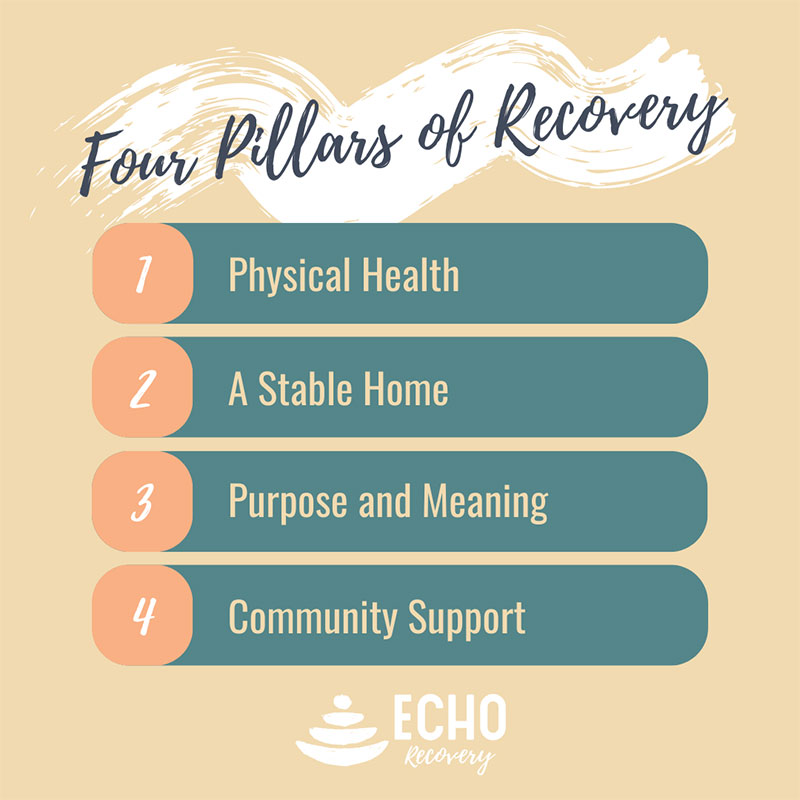One way to create a strong foundation is through the four key pillars of addiction recovery. Recovering from a substance use disorder is a challenging process and may require significant changes in your life. A substance use disorder impacts many aspects of your life, including mental health, physical health, relationships, connections with the community, and more. Altering these aspects of your life during recovery does not make the process any easier but is often necessary to retain the progress that’s been made.
It’s important to remember that you are not alone in the challenges you face. Many people nationwide and around the world are going through the process of recovery. You’ll also have support along the way, as it is possible to continue your journey in treatment and rehabilitation while working toward long-lasting recovery. To do so, it is key to provide yourself with the environment and tools needed for success.
SAMHSA’s Four Pillars of Recovery
To begin, it is crucial to note that there is no perfect path to recovery. Just as every individual is different, so is every SUD story and every recovery story. As such, there are many methods used by professionals to define a healthy approach to recovery, as well.
However, the Substance Abuse and Mental Health Services Administration (SAMHSA) defines the four essential pillars of recovery :
- Physical health
- A stable home
- Community support
- Purpose and meaning
These pillars are meant to provide a foundation for recovery, change, and a healthier life. Recovery is a long process that has different challenges throughout. The first few months and years of recovery are not the same as recovery later in your life. Recovery takes time to become established and lasts a lifetime – and a strong foundation supports you in success.
SAMHSA’s pillars provide insight into the four areas of your own health that are important to maintain for recovery. When you care for these four aspects of your mental and physical health, you can develop the strength and well-being essential for lasting recovery.

What Are the Pillars of Addiction Recovery?
Recovery is not a straightforward path, but by taking care of the four pillars of your personal health, you provide yourself with the strength, support, and care necessary to avoid substance use. Without caring for your own mental, emotional, physical, social, and spiritual health, you leave yourself significantly more vulnerable to future relapse.
Physical Health
An essential first step of recovery is taking care of your physical health. When you look after your physical health, your body is better equipped to handle stress and recover from the physical damage caused by substance use. You’re able to make more informed decisions, and your body is able to heal.

Take care of your body and health by making ongoing changes, including:
- Abstaining from substance use – This may include any potentially addictive drug or alcohol, not only the substance you are in recovery from. Find support from a treatment center to look after your physical health during this time.
- Schedule appointments with healthcare professionals – See a doctor, physical therapist, counselor, dentist, or other healthcare provider who can help improve your physical health.
- Eat a nutritious and balanced diet – and stay hydrated. Eating high-quality foods and complete meals can help your body heal and recover from substance use. When you’re hungry or eating non-nutritious foods, your body and brain are more vulnerable.
- Get enough sleep – Try to get quality time asleep and maintain a regular schedule to keep mentally sharp and improve your physical health.
- Take breaks – Find time to meditate and relax to engage in mindfulness.
- Get regular exercise – Exercise increases serotonin and endorphins, and there is a link between getting exercise and limiting the effects of depression, anxiety, and stress. Regular exercise can also improve your overall physical health – even something like a short walk every day can make a significant difference.
When your body is healthier, you can reduce the symptoms of mental health disorders and deal with stress or sudden emotional changes. These are all common effects of the recovery process. When your body is happy and healthy, it is often easier to avoid the temptation of substance use.
Psychological Health
Physical and mental health are interconnected, and it’s essential to look after your psychological health. Substance use disorders may result from mental health issues such as post-traumatic stress disorder (PTSD), anxiety, depression, bipolar disorder, schizophrenia, and combinations of these and other disorders. Treating these underlying causes of substance use can support physical health and recovery.
Treatment for mental health disorders or general psychological help during recovery includes:
- Attending professional counseling or therapy – This may include talk therapy or otherwise working with a mental healthcare professional to address trauma and learn coping mechanisms.
- Joining group therapy and 12-step meetings – Talking with or witnessing others who are going through the same struggles and joys during recovery can be cathartic, make you feel supported, and give you hope for the future.
- Going offline – There are several ways that social media can help and harm recovery. It’s important to recognize how the use of technology is aiding or hindering your journey so you can take steps that benefit your mental health.
- Practicing mindfulness – Take time in your day to center yourself, whether through meditation, yoga, or journaling. This can help your brain manage stress.

Another important aspect of your psychological health is a stable and safe home. Living in an unstable environment causes immense amounts of stress. If your current living situation includes people or circumstances with substance use, it could have a negative impact on your recovery.
It’s not always easy to find stable and safe housing. For many, it’s not financially possible. Substance use can cost a lot of money and make it hard to find work, leading to significant financial issues.
If you’re unable to move to a new place, reach out to friends, family, a sober living community, or temporary housing programs. When you’re in early recovery, a recovery and sober living community may be ideal for providing community support and a stable environment. Independent living or housing with safe friends and family can be ideal later in your recovery journey.
Social Support

Community and social support are other essential aspects of your personal health. Every human needs connections, whether that means family, friends, relationships, or any community of people who you can relate to. Healthy interpersonal relationships promote mental and emotional health and support your efforts toward sobriety.
You may find community in several ways, including:
- Group therapy, support groups, and peer support programs – You can find others who have been through or are currently dealing with the same issues as you.
- Local volunteer organizations – These can combine other aspects of health and allow you to make connections with others while giving back to your community.
- Therapy or counseling – Not only can therapy help with mental wellness, but it can help you determine the healthy relationships in your life and determine ways to make new connections. This also enables you to have a professional emergency contact if you are worried about your path during recovery.
- Close connections – In addition to or in lieu of therapy, have close individual friends or groups of friends that you can emotionally connect with and rely on. You may want to repair relationships that were harmed during your substance use, or you may want to reevaluate relationships that were abusive or otherwise unhealthy.
- Spending time with supportive groups of friends – Having a network or group of friends that support your journey to recovery is important, and it can be helpful to find friend groups who can enjoy time together without substance use and who have similar passions to you. Friends who are not supportive of your journey, pressure you, or engage in behavior that makes you uncomfortable are harmful friends, whether or not you are recovering from substance use.
- Adopting pets – For many people, a pet is a wonderful way to develop routines, have company throughout the day, and provide hope for the future. Pets also provide unconditional love that can help during recovery.
A supportive community and network of people you can rely on is essential to social and mental health and helps you feel a sense of belonging. Meaningful relationships help you improve your communication skills as well as your personal self-esteem. They also help with accountability, healing, hope, and encouragement during recovery. Your recovery will benefit from strong social ties.
Spiritual Health
For many people, recovery involves eliminating habits, hobbies, and activities. Though necessary, you have to replace those hobbies and activities with healthier alternatives. Otherwise, boredom and lack of focus make recovery more difficult.
When you have a focus and a passion in your life that doesn’t revolve around a substance, your recovery journey is more likely to be successful because you have motivation and joy from other sources.

You can find hope for the future when you engage in new and meaningful passions with people you love and who support you. Taking care of spiritual health means you find a purpose or a meaning in your life.
This is something different for every person and may include:
- Educational endeavors or goals – These are especially useful when you’re passionate about your learning.
- Work or a career path – In addition to a purpose, working gives you the financial resources needed to thrive.
- Volunteer work – You can spend time with others, work toward a common goal, and maybe even get some exercise. Most importantly, volunteer work gives you a purpose and allows you to give to your community.
- Caring for others – This may include family members, friends, or others in the community that you love, and your support may be financial, emotional, or physical. Helping a loved one can provide much-needed meaning and purpose.
- Mindfulness and meditation – This may include finding your purpose in centering yourself with your thoughts and emotions, connecting with the natural world, meditating through art, or other forms of mindfulness.
- Religion – Spiritual health may come in the form of spiritual practices and faith in their religion. You can find meaning in life by contributing to and working with your religious community.
- Creativity and art therapy – There are many creative activities that you could find a passion for, such as dancing, painting, singing, writing, or creating music. Art therapy is an effective way to merge a passion with mental healing.
There are many other avenues that may help you find a healthy path to finding meaning and passion in your daily life. Those in your support system may be able to help you.
How the Four Pillars of Recovery Work Together
When you focus on health and improvement in these essential pillars, it can aid in your recovery. They have helped many individuals form strong foundations in recovery, including someone very familiar to us here at ECHO Recovery, a person we’ll call Sarah. Sarah dealt with an opioid use disorder for many years. She attempted recovery time and again but suffered several relapses.
Focusing on the four pillars of recovery provided Sarah with a more comprehensive treatment and recovery program.
She did the following to address the four pillars:
- She focused on yoga and exercise to improve her physical health. This had the added benefit of a consistent and healthy routine, as well as increasing her confidence.
- She found psychological treatment for the underlying causes of her substance use and received care for trauma. Through this, she was able to learn techniques and coping mechanisms to manage triggers for substance use.
- She found support through peer support programs and group therapy. This gave her connections, belonging, and accountability during recovery.
- She practiced mindfulness and meditation. This helped her find purpose in life, hope for the future, and motivation to continue with her recovery.
Through this encompassing recovery, Sarah has been in recovery for more than two years and is continuing her recovery journey toward a productive, healthier, and happier life.
Find Long-Term Addiction Recovery and Support
As you can see, each of the four pillars of recovery is essential to supporting full, lasting healing from SUD. Without any of the four, the other three are unable to support recovery. In this way, all aspects of your personal health are interconnected. Therefore, focusing on each of the four aspects can help you manage your needs.
For recovery to be a successful journey, it is essential to take care of yourself and all your needs, whether physical, emotional, community-based, or spiritual. While recovery is not always a straight line, attention to these pillars can help you persevere and give yourself grace along the way. With these things in place, you, too, can reach lasting recovery. ECHO Recovery is here to provide you with addiction treatment and sober living resources.
References :
- https://store.samhsa.gov/sites/default/files/d7/priv/pep12-recdef.pdf
- https://www.ncbi.nlm.nih.gov/pmc/articles/PMC1526775/
- https://doi.org/10.1016/S0272-7358(99)00032-X
- https://www.nimh.nih.gov/health/topics/substance-use-and-mental-health

Experienced Chief Executive Addiction Recovery and Mental Health Professional
Business professional in the Addiction Recovery and Mental Health industry for the past 26 years. Caring, compassionate and strongly motivated to make a difference in the organizations I am affiliated with and welfare of the population we serve. Currently focused on advocating, educating and developing projects leveraging evidence based, real time technology to support individuals in recovery.


